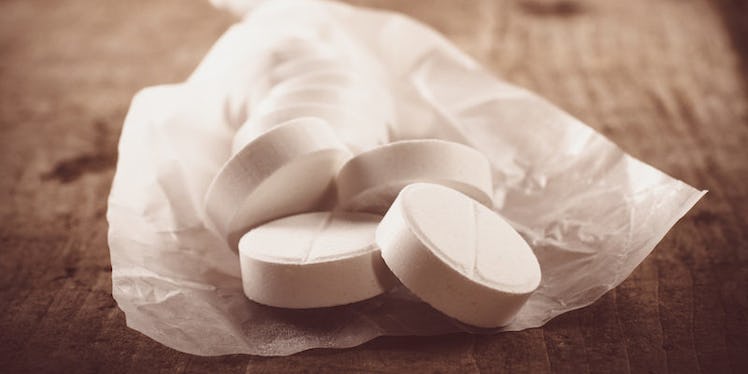
Why I Chose To Ignore My Ex-Husband’s Prescription Pill Addiction
December is National Impaired Driving Prevention Month, and it’s important to remember alcohol is not the only substance that can make you an impaired driver.
The statistics on the rising epidemic of prescription pill abuse are startling.
According to the 2013 National Survey on Drug Use and Health (NSDUH), an estimated 9.9 million people aged 12 or older (or 3.8 percent of teens and adults) reported driving under the influence of illicit drugs during the year prior to being surveyed.
By comparison, in 2013, an estimated 28.7 million people (10.9 percent) reported driving under the influence of alcohol at least once in the year, according to Substance Abuse and Mental Health Services Administration's 2014 study.
The National Highway Traffic Safety Administration’s (NHTSA's) 2013-2014 National Roadside Survey found that more than 22 percent of drivers tested positive for illegal, prescription or over-the-counter drugs.
This applied to both weekday daytime and weekend nighttime drivers.
The NSDUH data also proved men are more likely than women to drive under the influence.
According to the 2014 SAMHSA study, a higher percentage of young adults aged 18 to 25 drive after taking drugs or drinking than adults who are 26 or older.
In this study, "'illicit' refers to use of illegal drugs, including marijuana according to federal law, and misuse of prescription drugs."
Narcotic pain medication, commonly prescribed for chronic pain for after a surgical procedure, is the culprit in a growing epidemic of addiction and abuse of prescription pills.
They have become known as party drugs instead of aiding the conditions they are actually prescribed for.
What’s frightening about these medications is the user often is unaware of how extremely addicting the pills can be.
These drugs can quickly overtake and ruin your life, and hurt the people you love.
I know this firsthand.
In my early 20s, I started dating my ex-husband, Jeff *.
A few months into our relationship, he injured his knee at work and had to have surgery.
In order to manage his pain, he was given various prescriptions.
Initially, I didn’t think much of it, as he obviously needed the drugs to alleviate his discomfort.
Additionally, a doctor was prescribing them.
I reasoned it wasn’t as though he was buying drugs off the street.
The truth is, his addiction was growing and beginning to spiral out of control, and he was hiding many things from me.
Meanwhile, I was absolutely clueless.
In the apartment building we lived in, there was an older lady Jeff would help when she needed, and she introduced him to the doctor he began to use.
Over time, his behavior and personality slowly began to change, but I remained in denial about how serious the issue was.
His mother suggested rehab, and I would defend him.
After all, he obviously was just taking the doctor’s orders and recommendations.
I had no idea how wrong I was.
Addiction takes over the mind and body of the person afflicted, and common sense and all reasoning disappear.
Getting that high is all addicts care about. Their drugs are of the most importance.
When Jeff began seeing the doctor that our neighbor suggested, the doctor essentially asked for his medication wish list.
Jeff was getting high on a cocktail of OxyContin, Vicodin and Percocet, in addition to Klonopin and Lunesta to help him actually sleep at night.
Jeff didn’t need the medication for pain; he wanted it. He loved the high.
I didn’t learn this all until much later, years after our divorce.
His addiction wreaked havoc not only on our relationship, but on me, as I fell into a deep depression while I drowned trying to support us and our family.
After hearing about a local fatality on the news one day, Jeff realized he needed help.
A man was so high under the influence of prescription pills that he lost control of his vehicle and hit another car, instantly killing a 7-year-old girl.
Disturbed, Jeff confessed he had driven with our newborn son in the same condition.
He said he would never be able to forgive himself if he was the cause of harming our son or another person.
Thankfully, it was not too late for Jeff, but others may not be so lucky.
According to an Associated Press report:
Drug overdoses rose again last year, driven by surges in deaths from heroin and powerful prescription painkillers, according to new federal statistics. Overdose deaths in the U.S. surpassed 47,000 — up 7 percent from the previous year. Many of the deaths were due to a group of powerful opioid painkillers, long the leading cause of fatal overdoses. But the number had been stable recently while heroin deaths grew. Experts have speculated that addicts migrated from painkillers to cheaper and easier-to-get heroin. But last year, the opioid toll rose to nearly 19,000 deaths, an increase of 16 percent. Heroin deaths continued to climb, by 28 percent to about 10,500.
Two weeks ago, The Centers for Disease Control and Prevention posted this tally, and its findings are based on death certificates.
According to CDC director Dr. Tom Frieden:
The federal agency is analyzing the drug numbers to determine what's behind last year's increases, [but the nation's drug overdose problem] is not getting better.
These statistics prove it is important to not only be educated on how important it is to refrain from getting behind the wheel while impaired, but also to especially avoid these drugs that can pull you into the downward spiral of addiction.
People always think it will never happen to them until it does.
Stay informed, and stay safe.
If not for yourself, then do so for those who love you.
*Names have been changed.